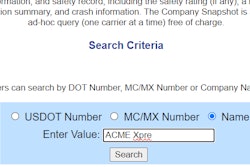Trucking news and briefs for Thursday, Oct. 10, 2024:
Spot market rates jump following Hurricane Helene
In the wake of Hurricane Helene and the accompanying relief and recovery efforts, the spot freight market saw the largest rates increase of 2024, according to the latest weekly report from Truckstop and FTR.
Total broker-posted spot rates in the Truckstop system rose to their highest level since early August during the week ended Oct. 4, as rates rose strongly for each of the principal equipment types -- dry van, refrigerated, and flatbed. All three saw their sharpest increase in a comparable week since at least 2008.
Total load activity rose 7.6% on Truckstop after increasing about 5% during the previous week. Load postings were about 8% above the same 2023 week -- the first positive comparison since late July -- but about 24% below the five-year average for the week. The week-over-week increase in volume was strongest in the Southeast region, supporting the conclusion that Hurricane Helene’s aftermath was the key stress on the market.
Similarly on load postings, DAT reported the total number of loads posted on DAT One increased 14.9% to 2.01 million week-over-week -- the highest number of available loads since the week after the July 4 holiday.
According to DAT, dry van loads were up 16.5% week-over-week, while equipment fell 21.5%. Reefer loads increased 16.5% week-over-week, with equipment down at 5.6%. Flatbed loads increased 11.5% week-over-week, with equipment down at 7.2%.
[Related: Regional emergency declared for Helene response | FEMA update on spot load postings]
Looking at rates, FTR and Truckstop's report indicated that total broker-posted rates increased more than 8 cents after ticking up just over a half-cent in the prior week. Rates were 0.4% above the same 2023 week for the first positive y/y comparison since late July but were still about 7% below the five-year average. FTR and Truckstop showed dry van spot rates up more than 7 cents after increasing 2 cents the week before. Reefer rates rose 8 cents after falling 5 cents the previous week. Finally, flatbed spot rates jumped more than 9 cents last week for its largest increase in a single week since May 2022.
The firms noted that the increase in total rates was strongest in the Southeast, although all regions saw some increase except for the Northeast, where rates were basically flat. Spot rates, excluding a calculated fuel surcharge, were about 11% higher than the same 2023 week and were positive y/y for all equipment types, FTR and Truckstop said.
 The current week (week 41) almost always sees lower dry van and refrigerated rates week over week, but effects from Hurricane Milton – expected to hit Florida’s Gulf Coast on Wednesday – and continued impacts from Helene could produce a different outcome.Truckstop and FTR
The current week (week 41) almost always sees lower dry van and refrigerated rates week over week, but effects from Hurricane Milton – expected to hit Florida’s Gulf Coast on Wednesday – and continued impacts from Helene could produce a different outcome.Truckstop and FTR
DAT also noted that Helene’s impact on spot market rates was significant. Due to constrained capacity, the weekly average dry van linehaul rates increased by 4 cents to $1.65 a mile. In DAT’s Southeast region, inbound and outbound rates increased by an average of 10 cents a mile compared to the previous week. In DAT’s Atlanta market, the average linehaul van rate was up 7 cents to $1.53 a mile despite a 3% decrease in load volume compared to the previous week. The average linehaul reefer rate in Atlanta increased by 10 cents to $2.13 a mile on a 7% decrease in volume.
The number of flatbed load posts was 23% higher year over year, DAT reported, and the weekly flatbed load-to-truck ratio was the highest in three years for the same week. The number of flatbed load posts increased by 14% week over week in the Southeast Region and was up 68% week over week in DAT’s Tallahassee market, where Hurricane Helene made landfall. Flatbed load posts in Houston and New Orleans increased by 27% compared to the previous week.
In Alabama, Mississippi, and Georgia, outbound flatbed load volumes plunged by 40% week over week. DAT reported that flatbed load volumes into the same states jumped by 44%, and the average spot linehaul rate rose 7% to $2.45 a mile. Freight markets in the path of Hurricane Helene saw outbound freight volumes drop 17% week over week while spot rates increased by 8 cents to $2.29 a mile -- 30 cents higher than the same week last year.
[Related: ATBS' owner-operator performance update: Inside the numbers, full presentation]
1st Commercial Credit launches Fuel Credit Card Program for new carriers
1st Commercial Credit, in collaboration with its affiliate Nationwide Commercial Credit, announced this month the launch of its new Fuel Credit Card Program, offering interest-free fuel credit to entry-level trucking companies.
The program provides interest-free credit and cash discounts at partnered fuel stations, activating automatically when a load is picked up and in transit. With no manual payment requirements or hidden fees, it allows trucking companies to manage fuel expenses seamlessly through a secure online portal. Credit amounts adjust to the value of each load, with a maximum limit of $2,000 per load, offering flexibility to meet specific needs, the company said.
Approval for the program is determined by the creditworthiness of the associated freight broker or shipper issuing the load, as well as the trucking company's proven ability to complete loads -- without considering the credit score of the trucking company or its owners. This feature is particularly advantageous for new companies looking to establish and grow their business.
The program features an automatic pay-down process, where the fuel credit is settled once the load is completed, eliminating worries about late fees, auto-debits, or accumulating debt.
Trucking companies are required to have an active factoring arrangement with Nationwide Commercial Credit to join the program.
Trucking Cares Foundation donates $10K to St. Christopher Fund
The Trucking Cares Foundation, the charitable arm of the American Trucking Associations, has donated $10,000 to the St. Christopher Truckers Relief Fund, a non-profit dedicated to supporting the families of truckers who have been sidelined due to injuries or illnesses.
“Trucking is a close-knit family, and whenever one of our brothers or sisters falls on difficult times, we band together to help them get back on their feet,” said Phil Byrd, chairman of the Trucking Cares Foundation. “Whether it’s delivering the products that Americans depend on each day or transporting humanitarian relief when disasters strike, truck drivers are always there to serve our communities. The St. Christopher Fund honors the sacrifices truck drivers make by having their backs when their families need it most.”
The St. Christopher Truckers Relief Fund, founded in 2007, provides financial assistance to Class A CDL over-the-road truck drivers when an illness or injury forces them out of work. Over the past 15 years, the St. Christopher Fund has helped nearly 4,000 truckers cover nearly $5 million in necessary household expenses such as rent and mortgage payments, utility bills, vehicle loans, and insurance. The organization also offers free preventative health and wellness initiatives such as diabetes prevention, smoking cessation, vaccines, cancer screening, and chronic disease management.
“We are deeply grateful for the Trucking Cares Foundation’s continued support and generosity,” said Shannon Currier, director of philanthropy for the St. Christopher Fund. “This donation provides essential support for drivers and their families by providing financial relief and free health and wellness programs that impact driver health and retention.”








